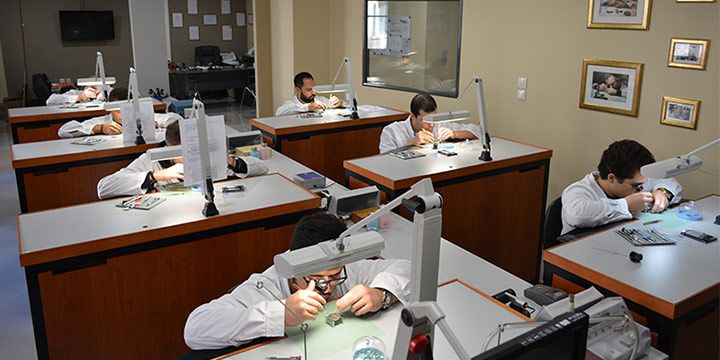Watchmaking in Greece Establishes Its Own School
We spoke with Dimitris Gerontopoulos about the modern watchmaking school founded in Greece and learned many interesting things about this unique craft.
If you are young, creative, and looking for a profession that suits you, read on—you may find that watchmaking is the perfect field for you!
1) What is the most important thing a young person should know before becoming a watchmaker?
Watchmaking remains one of the few noble, precise, and creative professions.
A future watch technician must understand that this job requires patience, perseverance, focus, and discipline. It is a profession where one improves only through repetition—that is, with consistent daily practice.
Based on my experience, I can confidently say that a skilled watchmaker will never be out of work. Furthermore, they can choose to specialize in one of the many subfields of watchmaking.
2) What does the Watchmaking Lifelong Learning Center offer its trainees?
The Watchmaking Lifelong Learning Center is Greece’s first official watchmaking school, recognized by the state.
It offers comprehensive training in watchmaking, providing trainees with the skills needed to work professionally or continue their studies abroad at prestigious private institutions.
Graduates can even pursue a postgraduate degree in watchmaking from an international institution.
3) How long does it take to become a certified watch technician?
The Watchmaking program consists of one academic year, divided into two mandatory training cycles.
- The 9-month course runs from October to June, totaling 700 hours of training.
- Upon completion, students receive a state-recognized certificate of knowledge (though not an official state-issued professional license).
Like all Lifelong Learning Centers, Watchmaking provides specialized expertise but does not issue a public vocational certification.
4) What is the best way for a graduate to enter the job market?
Since all graduates lack professional experience at first, they should not be discouraged when looking for a job.
A “learning period” is expected before they fully integrate into the industry.
There are Greek employers willing to hire new watchmakers and train them further for specific tasks and products. If employment is not immediately available, a graduate can start independently by investing in specialized equipment—though the process may be slow at first.
For experienced professionals, proving their skills is crucial. Employers will likely test their abilities through hands-on work trials.
5) Does the curriculum include both theory and hands-on practice?
Yes, the Watchmaking Center places great emphasis on theory because understanding the why behind a technique is crucial before attempting it in practice.
- The theoretical lessons use multimedia and visual materials.
- Once the theory is mastered, students move on to practical training with professional tools and watch movements (both mechanical and electronic).
6) What is the most exciting part of this profession?
There isn’t just one!
- Leading a group of passionate learners who are eager for knowledge is exciting.
- Shaping trainees' professional mindset and preparing them for the demanding world of watchmaking is fulfilling.
- Most fascinating of all: bringing a lifeless watch movement back to life—especially when the timepiece holds sentimental value for its owner.
7) What advice would you give to someone considering a career in watchmaking?
Just go for it!
I would wholeheartedly encourage any young person to pursue a career in watchmaking.
If you possess patience, persistence, discipline, cleanliness, focus, courage, and a touch of perfectionism, you can thrive in micromechanics, which is directly linked to watchmaking.
Whether as a technician, designer, or watchmaker, this profession will remain relevant as long as people need to measure time.
8) What inspired you to establish the Watchmaking Lifelong Learning Center?
My long experience in watchmaking made it clear that there were major gaps in:
- Knowledge
- Technical expertise
- Tools & equipment availability
- Professionalism in the industry
In Greece, watchmaking is often misunderstood as a profession. However, precision is essential—there is no room for rushed or careless work when dealing with time.
That’s why I founded the Watchmaking Learning Center—to share my expertise and elevate the profession in Greece.
9) What challenges did you face in starting the school?
None! Because when I sought support from the Greek government, no organization or ministry was willing to assist with the creation of a school of this caliber.
So, I built it from scratch, on my own.
10) What is the first thing you tell new trainees?
"Thank you for trusting me to provide you with top-level knowledge! I promise we will have an excellent and creative academic year full of positive surprises. Welcome to the world of watchmaking... Welcome to Watchmaking!"
www.neolaia.gr - 18 January 2018
From neolaia.gr Team
See the article

